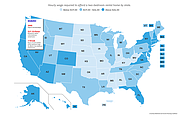Report: Rental prices, wages gap growing
SANDPOINT — Full-time workers in Idaho need to earn $21.53 per hour to afford a two-bedroom apartment at fair market rent, according to a new report.
The National Low Income Housing Coalition and the Idaho Asset Building Network on Thursday released the "Out of Reach" report that calls attention to the gap between wages and incomes.
The report’s “Housing Wage” is an estimate of the hourly wage full-time workers must earn to afford a rental home at fair market rent without spending more than 30% of income.
“When families spend more than 30% of their income on rent, they are unable to afford the necessities they need to ensure their household has access to important medical visits and medications, nutritious food, quality daycare, and other necessities,” said Angelica Moran, a policy specialist with the Idaho Asset Building Network.
In Kootenai County, the hourly wage necessary to afford a two-bedroom unit is $23.62, while the average renter wage is $16.47, the report said.
In Bonner County, the hourly wage to afford a two-bedroom unit at fair market fair was $18.37, while the average renter wage was $16.80.
According to the report, a two-bedroom unit at fair market rent in Sandpoint is $1,228, but that's hard to find.
Properties currently for rent in Coeur d'Alene include a one-bedroom, 778-square-foot unit for $1,650; a three-bedroom, 1,186-square-foot unit for $1,950; and a two-bedroom, 1,031-square-foot unit for $1,795. One of the least expensive was a 400-square-foot studio in Coeur d'Alene offered at $825.
Properties currently for rent in Bonner County include a three-bedroom, two-bath property in Ponderay for $2,800 per month; a three-bedroom, two-and-a-half-bath townhome for $1995 per month; a two-bedroom, one-bath home is Sagle for $1,500 per month, and a one-bedroom, one-bath home in Sandpoint for just under $1,000.
Connect Kootenai, a nonprofit, is working on solutions to the rising cost of housing in the area.
Many people are paying more than 50% of their wages toward rent, according to Connect Kootenai, which leads to problems across the board.
“We know that housing costs across the state are adding significant financial pressure on Idaho families,” said Karen Vauk, president and CEO of The Idaho Foodbank.
Working at the minimum wage of $7.25 an hour in Idaho, a wage earner must have three full-time jobs or work 119 hours per week to afford a modest two-bedroom apartment and have 2.4 full-time jobs or work 95 hours per week to afford a one-bedroom apartment.
"The pandemic has taught us many things. Among them is just how vulnerable many people are — how fragile their relationship with stable housing is,” said Denise Caruzzi, former president of the Boise/Ada County Homeless Coalition.
Idaho renters were facing a housing crisis prior to the pandemic, with rents increasing much more quickly than wages, federal assistance programs remaining underfunded and the lack of state programs that assist renters, the report said.
"With the arrival of the pandemic, widespread job and wage losses, followed by skyrocketing rents exacerbated the situation, putting additional pressures on renters throughout the state," the report said.
Though rent inflation has moderated in most markets and is now at pre-pandemic-or-lower levels, rents remain too high for low-wage workers and other low-income renters, the report said.
At the same time, pandemic-era benefit programs like emergency rental assistance are ending.
"In consequence, the lowest-income renters are facing high rents without the support of those safety net programs that kept them stably housed during the pandemic, with the result that eviction filings are returning to or surpassing pre-pandemic levels in some communities," the report said.
Vauk said the report, "reminds us how interconnected the basic needs of housing and food are for Idaho families."



